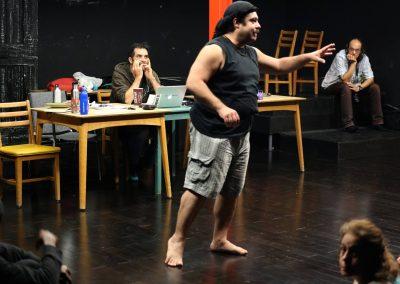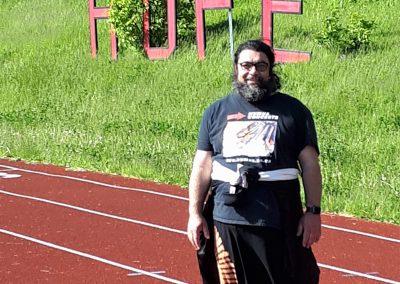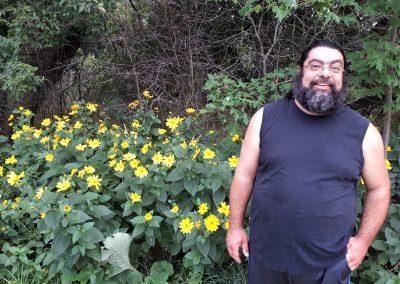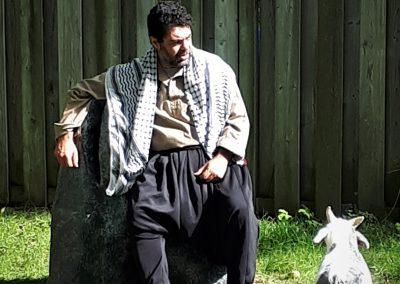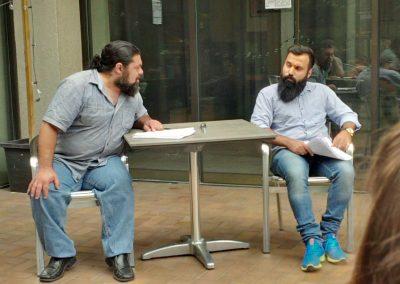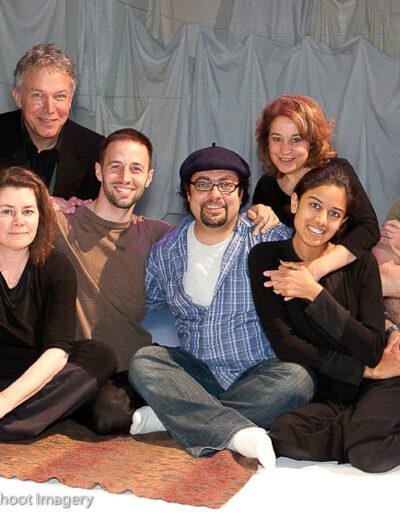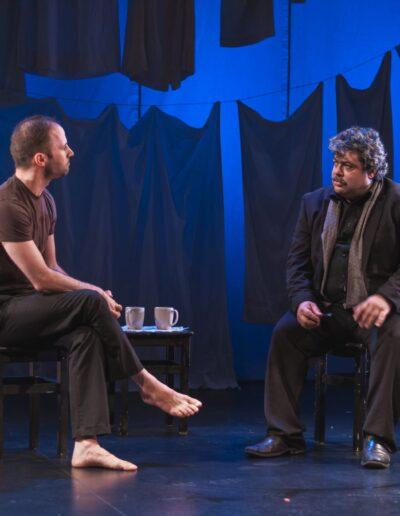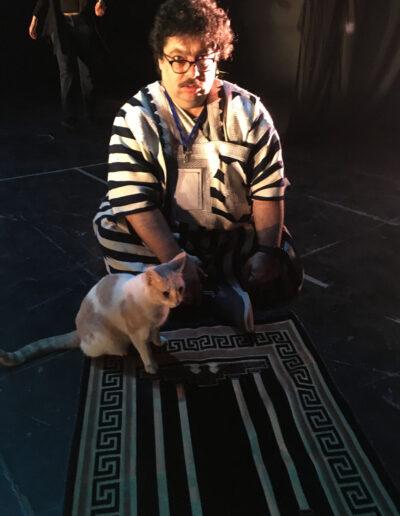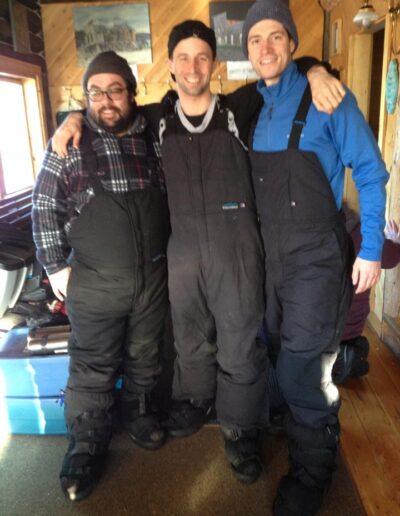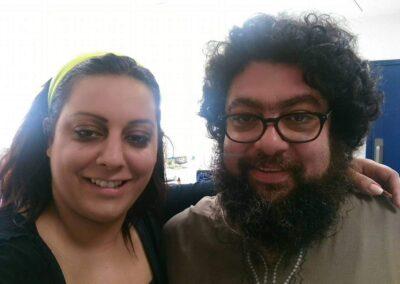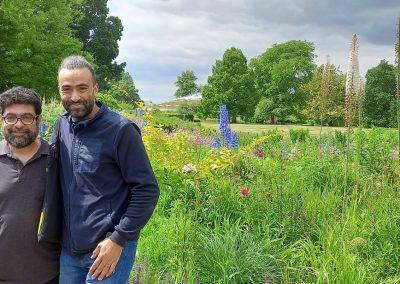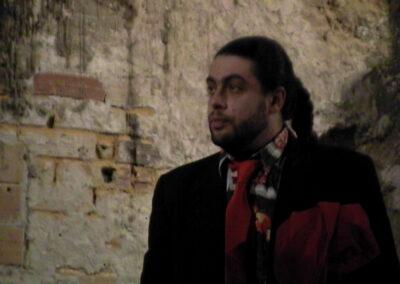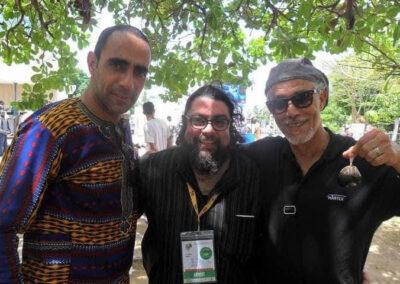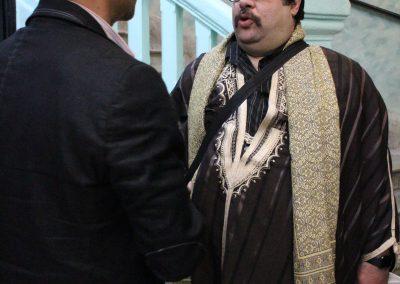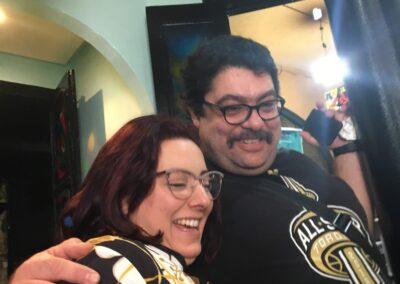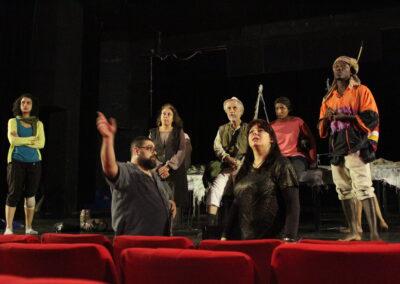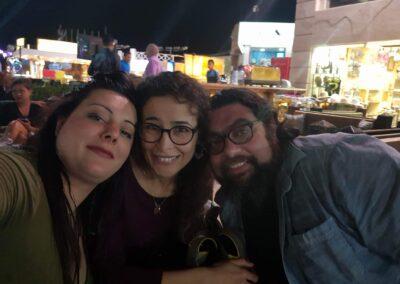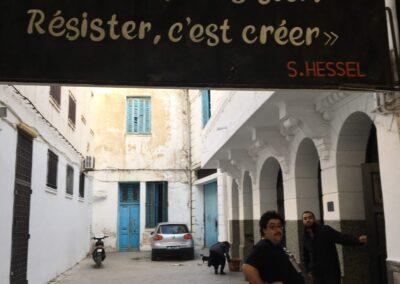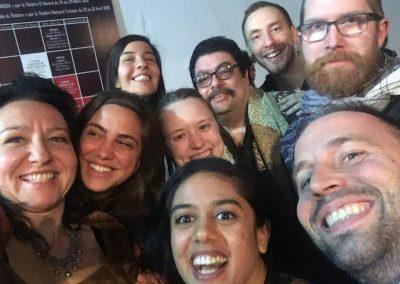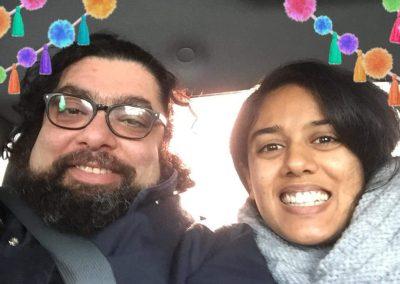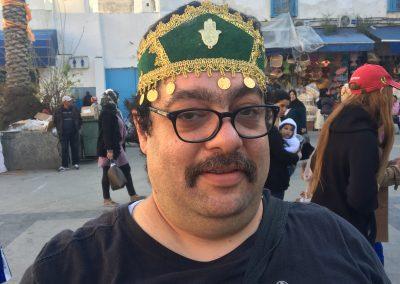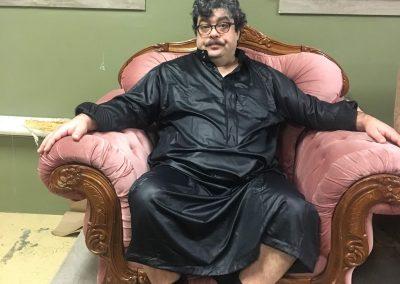Remembering Majdi
Majdi Bou-Matar.
Theatre maker, director, actor, presenter and producer.
In late June 2022, we learned our beloved friend, colleague, and founder of MT Space, Majdi Bou-Matar, had passed away unexpectedly. A trailblazer in our industry, both nationally and internationally, Majdi touched many lives through his work and his love for the community.
He founded MT Space back in 2004 for racialized and marginalized voices to tell their stories, while addressing the social issues of our times. Majdi brought different communities together to create a community of difference.
This page is dedicated to Majdi Bou-Matar as an open, living, online memorial — a communal celebration honouring the life of a giant in Canadian and international theatre.
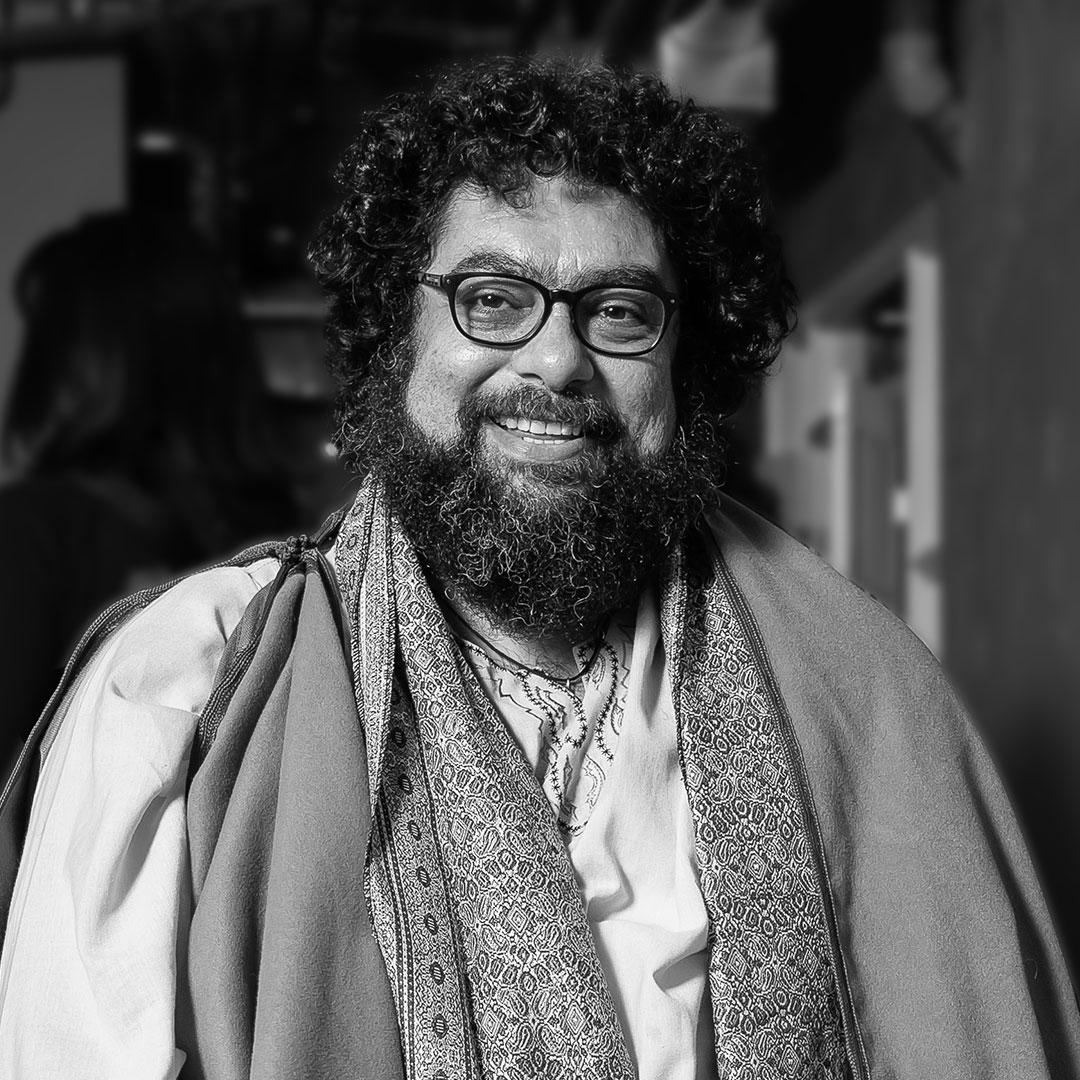
About Majdi
Majdi Bou-Matar (1974 – 2022) was a theatre director and performer who immigrated to Canada from Lebanon in 2003. He holds an MA degree in Drama from the University of Guelph with a research focus on Canadian intercultural theatre, a BA degree in directing from the Lebanese American University, and BA Honours in theatre studies from the Lebanese University. Majdi directed several productions in Beirut and was a key participant in several theatre, television, and film projects in the Middle East and Tunisia.
Majdi represented his country of origin in the Afro-Arab Centre for Theatrical Research in Tunis where he gained considerable knowledge in the inter-cultural aspects of theatre. An active member of the Waterloo Region arts community, Majdi founded The Multicultural Theatre Space (MT Space) in 2004.
“MT Space’s culture is that of the people. Keep it like that and you will always find yourself surrounded by the best people. Keep your doors open. Literally do not close any doors. Do not ask people to call, buzz or knock before they come to see you. Tell them just to walk in.
Remember that sometimes when theatre empowers one marginalized person, its impact on the community could be far greater than the impact of a passive show enjoyed by thousands. Rules and regulations are put in place to make people’s lives better, fairer and more efficient. Don’t hesitate to break those rules that don’t.”
~ Majdi Bou-Matar, when asked by incoming Artistic Director, Pam Patel,
“What advice or wisdom can you impart to me as I step into your humongous shoes?”
At MT Space, Majdi designed and managed several programs using theatre as a tool for community building, settlement, and social change. Such projects include the Newcomer Youth Theatre Projects with the YMCA of the Three Rivers and Theatre for Social Change with the Centre for Community Based Research. His work continues to tour nationally and internationally.
Majdi is the founding Artistic Director of IMPACT (International Multicultural Platform for Alternative Contemporary Theatre), an award-winning biennial international theatre festival in the Waterloo Region.
In 2017, Majdi was named Presenter of the Year by the Canadian Association for the Performing Arts.
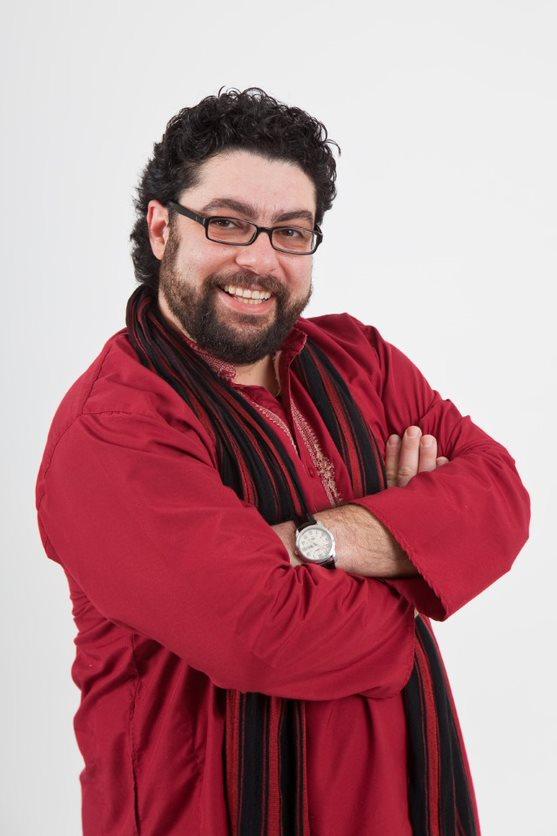
Select Credits:
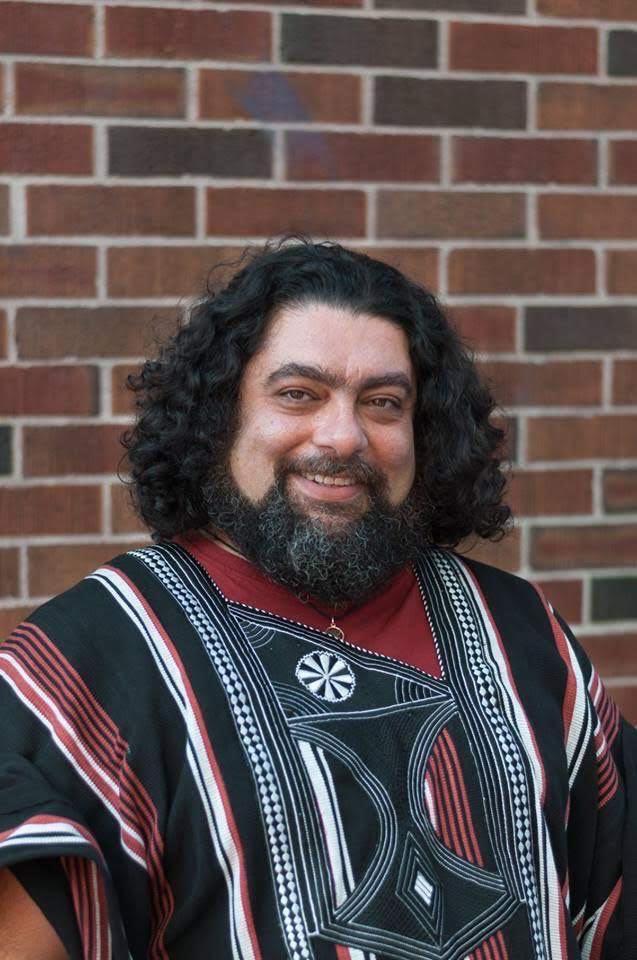
“If an actor has serious issues to express, they will explode—better they explode on stage.”
~ Majdi Bou-Matar
Director & Producer:
Suitcase (2020)
Besbouss: Autopsy of a Revolt (2019)
Amal (2018)
The Raft (2016 – co–directed with Cyrine Gannoun)
Sultan Basha/Adrenaline (2016)
Paradise (2015)
The Art of Getting Married (2015)
Return Home (2014 – co-directed with Diane Roberts)
Body 13 (2011)
The Last 15 Seconds (2009)
Exit Strategy (2007)
Yes or No! (2006)
Seasons of Immigration (2005)
Three-Legged Horse (2004)
Something Like Macbeth (2000)
Ana Sharkiya (2000)
Al-Anisa, an adaptation of Miss Julie (1999)
Nijinsky in the hour of his Wedding to the Lord (1998)
Al-Sahra Al-Karawieh (1996)
Assistant Director:
Beirut Jaune (2002)
Actor:
The Bell (2021)
I Don’t Know (2021)
The Last 15 Seconds (2017-2022)
White Rabbit Red Rabbit (2012)
Parlons en Silence (2003)
Al Rasoul Al Majhoul fe Maatam Antigona (1996)
Al Sarsor (1993)
Dancer:
Orinana (1999)
Selected Writing, Speeches, & Conversations
“For Ahmad, theatre—his major passion and dream—became his life’s catalyst and refuge. For me, it was so great to know that theatre could change something real after all—I’ve been having my doubts recently.”
Letters from Canadians to Americans – Majdi Bou-Matar (Feb 21, 2017)
Read More (Howlround Theatre Commons)
“I cannot help but ask myself often these days: Is theatre relevant in the times of ISIS, global warming, and the current refugee crisis?”
SpiderWebShow – Theatre in the Time of ISIS (Nov, 17, 2015)
Read More (SpiderWebShow)
“An ethnic group’s urge to preserve its original culture through promoting its own folklore is powerful; yet it widens the gap between Canadian culture and Canadian Theatre. The MT Space’s response to these challenges came from engaging the community in the act of creation.”
Creating an MT Space: Multicultural Performance beyond Folklore CATR (2006)
“These institutions are no doubt long-standing staples of our community, but they mostly represent the dominant Eurocentric establishents and its audiences. This keeps only 6 per sent of the funding available to shared by all other art groups, and there are a lot of us doing a lot of awesome things on shoestring budgets.”
Reflections on Dialogic Theatre for Social Change – Co-creation of the Other End of the Line – Classroom Action Human Rights, Critical Activism and Community-Based Education – UofT Press 2017 (pg 115)
“The whole work is not just about teaching or performing theory, it is about defining ourselves and re-discovering ourselves as people.”
Including the Inclusive – An Online Conversation with Col Cseke, Hope MacIntyre – Canadian Theatre Review – Funding (Summer 2016, pg 34)
Selected Media & Press
“Majdi Bou-Matar, iconic theatre director, dies at 47”
– The Waterloo Region Record
Read more (Waterloo Region Record)
“Majdi Bou-Matar wins Lifetime Achievement Award”
– CTV Kitchener
Watch the video (YouTube)
Mike Morrice, MP-Kitchener Centre,
honouring Majdi Bou-Matar and his legacy
Watch the video (YouTube)
“An Appreciation of Majdi Bou-Matar”
– The Slotkin Letter
Read more (The Slotkin Letter, Blog)
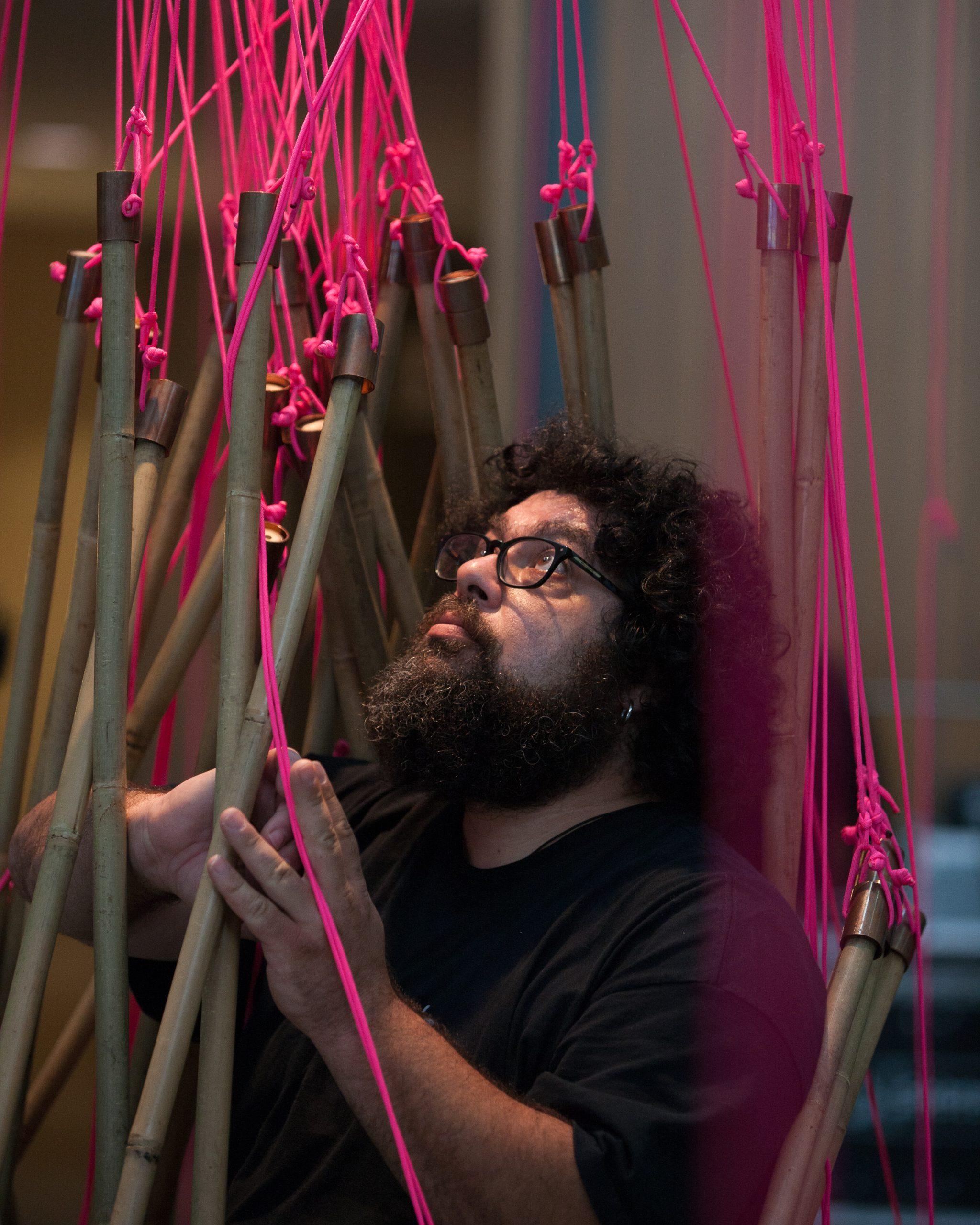
Memorial Submissions
Reflections and favorite images, events, productions, stories shared by friends, colleagues, mentors.
Submitted by Carolina Miranda | Former Collaborator
"What has always stayed with me, was the way he said my name..."
“Majdi’s vision shaped an entire community. Back in 2003, our conversations about belonging, name pronunciation, sense of space began to take physical form through moving bodies and improvisations with words on stage that involved many accents, many languages, happening simultaneously. It was a vanguard for those looking from the outside, but for us, it was just a need to survive, together, through mutual understanding. What has always stayed with me, was the way he said my name – with all the vowels and the Rs fully pronounced and emphasized, punctuated by his unique smirk and belly laugh.”
Submitted by Gary Kirkham | Former Collaborator
"That rehearsal hall with Majdi is my favourite place in the world to be..."
“My name is Gary Kirkham. I met Majdi Bou-Matar for the first time when I was working on Seasons of Immigration – 18 years ago this month – and I written some text for the piece and gave it to them and came back a few weeks later to see what they’ve done. And as a playwright, I’m kind of used to hoping that people sort of get the essence of my piece. And when I walked into the rehearsal hall, it wasn’t at all what I wrote. Not at all. It was something so so so so much more. Watching it I got chills. My eyes filled up with tears. This was not what I wrote. This was something beautiful and poignant and I realized… I need to do this. I need to work with this man.
And over the last 18 years, we worked with each half a dozen times and it’s been an amazing journey to be mentored by Majdi. To work with him. To create with him. There’s this photograph – one of my favourite photographs – it’s of us in the rehearsal hall and Majdi’s on his feet, and full of passion, talking with all the actors, and I’m there – sitting there – like a kid with a schoolyard crush. That rehearsal hall with Majdi is kind of favourite place in the world to be. Cause it was filled with passion and life. I think in rehearsal hall, he got us to be our best selves. And sometimes our worse selves. But being there – creating with him – was a gift.
They say we don’t die until the last person who remembers you dies. I’m going to remember you for a long time.”
Submitted by Patti Flather | Award-winning storyteller – playwright, writer, theatre artist, and cultural producer in the Yukon, Canada
"Majdi melded movement, images, and urgent human stories in the most imaginative theatrical ways..."
“I’m Patti Flather, sending you this message from the territory of the Kwanlin Dün First Nation and the Ta’an Kwäch’än Council in what is also known as Whitehorse, Yukon.
It is difficult to put my heartbreak at the loss of Majdi Bou-Matar into words. A heartbreak I know I share with so many of you. Our world has lost a brilliant theatre artist and human being with an endless capacity to love and be loved, here and around the world, with room always for more of us in his heart.
Majdi melded movement, images, and urgent human stories in the most imaginative theatrical ways, with compassion, sensitivity, and startling beauty. I cherish Majdi’s unflinching commitment to social justice. His ability to fight for what he believed in – in art and life – his generosity, sharing all that he knew about theatre, about the best shawarma, anything. His curiosity for learning from others. His respect for all of us. Majdi was utterly lovable and hilarious, a loyal friend, a teacher, a mentor. An ally, forging meaningful relationships between Indigenous and newcomer communities. Passionate with a zest for life. And blunt, which I both admired, and envied.
To me, he seemed fearless, not afraid to say it like it is without ruffling feathers.
I know he faced huge challenges as a theatre artist. The constant search for funders. Our indie theatre world can be hard, exhausting, lonely, especially for voices outside the good old boys mainstream settler theatre establishment. With closed doors, closed spaces, polite nos, snubs, flat-out silences, difficulties finding venues and places to create, and present, and tour. His work, our work.
Still Majdi accomplished so much. As the MT Space website recounts, “After receiving the same criticism over and over, hearing that his accent was too thick or that he “didn’t look the part”, Majdi decided to create a company that would become a platform for all artists that felt marginalized, racialized, and displaced. This is how MT Space was born.”
Majdi faced challenges as well. As a compassionate human being, it’s not easy to walk in this world with one’s eyes truly open. Yet, this is what we must all continue to do. This is part of Majdi’s legacy.
My path crossed Majdi’s too briefly. But my times working with him and attending IMPACT festivals are among the best of my life. In Kitchener-Waterloo, here in the Yukon, and on tour with my play Paradise, in our MT Space/Gwaandak theatre collaboration This was both unlikely and unique. Bringing together Majdi, a director who notoriously resisted text-based work, with me as a playwright with a jumble of words and scenes leaping across time and space, and MT Space company and Yukon artists.
What emerged was a potent fusion of text-based, physical and intercultural devised work. I also won’t forget seeing and being blown away by Majdi’s work in productions including The Last 15 Seconds, The Raft, and Body 13. Along with supporting collaborators, too many to name, but including Pam Patel, Nada Homsi, Trevor Copp, Ahmad Meree, Gary Kirkham, Ric Knowles, Nick Cumming, Dima Alansari, Tawiah Ben M’Carthy, Tera Beagan, Diane Roberts, many many others.
The partnerships, holding up other artists and companies – regionally, nationally – including Gwaandak Theatre, and around the world. I felt alive in the doors the doors he opened wide, the debates he relished, the fabulous dance parties at IMPACT, famous hugs from Majdi. I learned from him in the spaces he carved out. He challenged me as a playwright, to listen, to learn, to grow. Always in an open room, with an open door, inviting others in to share their opinions. His visions, the world, the whole world could look like this, be like this. A place with open debate with love and respect. And yes, difficult debates. He created that world at MT Space, the theatre company he founded, and which lives on, now, into the future, because Majdi is Batman, held the door open for Pam as Robin, and many others including all of you who will be at this IMPACT, in 2023.
Majdi shared all of it with us. In his work, the work of IMPACT, our collaborations. His generosity and teaching and collaborating. He embraced and reached out, across cultural and other differences. He spoke of his traditions back home in Lebanon many times, but I remember him saying to me, “People return to the theatre over and over back in Lebanon.” He didn’t mind if someone didn’t like one of his shows and walked out of the theatre. That is their right as an audience member. And as an artistic director, he never programmed only for himself, only picking his favourites. He programmed all kinds of work, for all kinds of people.
He spoke of racist bullshit he encountered especially in the post-9/11 world. He programmed our Gwaandak Theatre touring show Café Daughter, which we premiered, by Kenneth T. Williams, directed by Yvette Nolan. He barely knew us, and he programmed us. And then after that, the devised work Map of the Land, Map of the Stars, which was directed by Yvette, along with Michelle Wilson.
He didn’t get the full recognition he deserved in our wider Canadian theatre community. We know life isn’t fair, but we’re doing all that we can now, because Canada still has so much to learn from people like Majdi, and with this bursary and with the work we’re all doing, there will be next generations continuing this. His impact lives on. His legacy lives on. Theatre is Majdi. Theatre is all of us. Moving this legacy forward, with Majdi’s memorial bursary, with IMPACT, with our own work, vision and love. Yallah. Let’s go together.”
Submitted by Ric Knowles | Scholar, editor, director, and Dramaturg
"Majdi held doors open for anyone who had not previously been allowed access..."
“Good evening, everyone. First, I want to express my gratitude to Rania for the opportunity to pay tribute to my friend Majdi, one of the greatest, most towering personalities and presences I have ever encountered. Ours was an unlikely friendship, but surprisingly deep, crossing cultural, generational, and many other differences that might have divided us, but didn’t. Mainly because of Majdi’s enormous generosity of spirit, his openness, and his capacity for love, life, and pleasure. It was a friendship for which I am and will remain eternally grateful. Majdi was a larger-than-life magician-of-a-man who invited me into his orbit and left me permanently transformed. I only knew Majdi for, I think, 16 magical years of encounter and collaboration, fierce argument and equally fierce agreement. He always introduced me—in KW, in Toronto, in North Africa, and beyond, to his family, friends, and colleagues—as his teacher and mentor.
This was generous of him, but not true. Although he was, formally, my student during his graduate studies at the University of Guelph, where he was brilliant, and although I nominally supervised his master’s thesis, I learned—we all learned—a great deal more from Majdi than he ever did from me. We learned from him about theatre, of course, and about directing, especially movement. But we also learned about international and intercultural politics, about negotiating cultural difference, about respect, about openness, and about welcome. As many of you know, Majdi hated closed doors with a passion. For him, a closed door was an insult. I had previously learned from other directors and teachers that rehearsal halls were sacred spaces, to be carefully guarded from outside intrusion. “What happens here stays here.” But no: Majdi threw open the doors, in rehearsal and elsewhere, to everyone, engaging the entire community in the creative work, welcoming the input of everyone who dropped in, and taking that input seriously.
We learned, from him, the value of inclusivity in a process that I had previously understood to be enclosed, exclusive, privileged. We learned to keep doors open. And this openness went well beyond the rehearsal hall: Majdi held doors open for anyone who had not previously been allowed access, who had never been invited to the table, had never been encouraged to be fully engaged—in life, not just in the theatre, but on this planet. Majdi also taught us about helping to form, consolidate, and rally community, whether that means the local community in KW, one’s own cultural community or communities, the local, national, or international theatre communities—he was a star in the Arab theatre world as he was in the Canadian one—and he taught us about forging the many and varied solidarities and mutual supports across all of these communities, solidarities and supports that make real action possible.
But perhaps most especially we learned from Majdi about leadership. He founded and led an outstanding intercultural theatre company in what had always been considered an unlikely location. It was a theatre company that, astonishingly, has had a huge national and international IMPACT, with vision and commitment that was as unrelenting as its founder, and as effective. And he led a festival by that name—IMPACT—that was, and remains, one of the most important and respected intercultural theatre festivals in the world, located in a city that provides little support for such an enterprise. “If you’re so good,” the saying goes, “why are you in Kitchener?” But in local, national, and international forums Majdi spoke frankly, fiercely, and frequently on behalf, not only of his own community, but of all marginalized communities, including—crucially in Canada—Indigenous communities, forging alliances between immigrant and Indigenous peoples that have proven to be prescient and necessary.
And he taught us about fighting, honestly and openly–often aggressively and gloriously impolitely, if also always with compassion—for what you believe in, for social justice. Majdi was, as most of us here know, a brilliant, innovative, and endlessly inventive artist. But he was so much more than that. For me, finally, and for so many of us here and far beyond, he was, and remains, a friend.”
Submitted by Isaac Thomas| Executive Director, Belfry Theatre
"I often wondered, had I met Majdi earlier, would my path have meandered differently?"
I often wondered, had I met Majdi earlier, would my path have meandered differently? I kept hearing about him for years. I was completely intimidated by him, based on hearsay, long before I actually met him more than a decade after I moved to Canada. But then in person he was so welcoming and open. It perhaps helped that we could look at each other and immediately understand some of where we came from, what we probably went through, and how it all impacted us.
I saw him once at a play passionately holding forth at a playwright because he fundamentally disagreed with the playwright’s lack of political awareness. And though the playwright was of community, no quarter was given. He held himself to the same standards. He once impatiently said to me, don’t be polite, you have to tell me what you disagree with, otherwise my work will not shift. I hold on to that idea – we have to speak up.
Majdi spoke up. And for many of us who did not or could not speak up, we needed his voice. There has been a cost to our silence.
I wish you peace, Majdi. Khuda haafiz.
Isaac
Submitted by Lawrence McNaught | Director of Programming and Development, The Registry Theatre
Submitted by Rahul Varma| Artistic Director, Teesri Duniya Theatre
Majdi and Rahul issued a joint statement on Gaza in the aftermath of an Israeli attack in 2014.
Majdi and Rahul issued a joint statement on Gaza in the aftermath of an Israeli attack in 2014. A copy of this statement is Rahul’s submission to the celebration of Majdi’s life.
Read Statement | PDF
Submitted by Andy Houston | Associate Professor of theatre and performance at the University of Waterloo
Majdi’s Form of Influence - By Andy Houston
Andy Houston is an artist-researcher in intermedia and site-specific performance, and an associate professor of theatre and performance at the University of Waterloo. Andy sent his article on Majdi’s influence as his submission to the online memorial.
Majdi’s Form of Influence
By Andy Houston
Majdi Bou-Matar was a unique presence in Waterloo Region. He is deeply missed by many, especially those of us who experienced his impact on the way we make theatre. To honour his memory and influence, I have tried to sum up three aspects of Majdi’s work with the MT Space and the IMPACT Festival that have made a lasting impression on me. I have deliberately used extended quotations from Majdi because I think he was remarkably articulate about his approach to the creation of theatre as well as the creation of community.
Majdi understood how theatre is a uniquely live art form, and the best way to access this liveness is through non-naturalistic approaches to staging. I first met him during a rehearsal of a site-specific performance I was directing in one of the former Lang Tannery buildings, in March of 2004. The project was a multi-media animation of the lives of former employees of the tannery, entitled Mimetic Flesh. Having just moved to the region two years previous, this was my second site-responsive performance project in the area, and it was a risk, both in its scale (we used three storeys of one of the main buildings) and its form (our modes of performance were physical and influenced by non-naturalistic approaches to theatre-making). I was working with twenty-four students from the Drama (now the Theatre and Performance) program at the University of Waterloo. In addition to the challenging style of presentation of this work, Mimetic Flesh was revealing some harsh truths about labour exploitation and racism in the early days of the tanning industry in Kitchener, back when the city was called Berlin.
Contrary to the flashy tech-hub that is the “Tannery District” today, in 2004, the Lang tannery was mostly an under-utilized, toxic collection of buildings, near downtown Kitchener; so, on top of creating a performance that was aesthetically and politically challenging for our audience, at the beginning of each performance, we asked them to put on protective Tyvek PPE suits and sign a waiver acknowledging they understood they were entering a space that could potentially put their health at risk. Majdi understood all of this: the non-naturalistic form of performance, the risky environment, the critical approach to local history and sense of place; all of it was familiar to him. He is the first person I encountered in the Waterloo region who actually understood what I was trying to do in the former Lang Tannery. With everyone else working in local theatre at the time, I would need about 30 minutes to describe what I was trying to achieve aesthetically, why I was putting everyone at risk, and why I was revealing a layer of racist subtext to our region’s proud industrial history. Majdi’s education and experience made him an instantly valuable colleague and friend; indeed, a brother in the creation of experimental theatre, and for this, I am so incredibly thankful that he chose to live and work here, and for the time, expertise, and wisdom he shared with me.
Majdi’s unique approach to theatre creation challenged the colonial forms of theatre given prominence in southern Ontario, from the naturalism of the Shaw Festival to the emphasis on a particular form of English in Shakespearean plays staged at the Stratford Festival. Majdi’s vision of an intercultural form of theatre creation and staging centred the bodies, actions, and personal reflections of recent immigrants to Canada.
Majdi understood that the creation of intercultural theatre was the most authentic form of theatre creation for Canada, a country with a rich mosaic of cultural influences from settlers who have come here from all over the world, as well as from Indigenous cultures, who have been striving for acknowledgment of their existence and contribution to our country for centuries. In a keynote address that Majdi made to conference-goers at the Canadian Association for Theatre Research conference, held at the University of Waterloo in 2012, entitled “Creating an MT Space: Multicultural Performance Beyond Folklore,” he identified a couple of crucial insights about why the process of creation he was developing at the MT Space was particularly well-suited to Canada.
He stated:
The process I use in performance making is based on constructing each project as a creation in progress, consisting of daily improvisations, discussions, and basic physical and dance training. This approach combines different performing disciplines and styles, while at the same time allowing the personal story of each performer to be told through his/her own rhythm. Furthermore, it enhances each individual’s own culturally embedded way of movement and expression. Some aspects of this process will involve musicians, designers, and writers. This ensures that the director has no definite expectations of the final overall form of the performance – a broader spectrum of creativity should lead to a more stimulating relationship between the performers and their audience.
Having spent some time in Waterloo region attending professional and amateur performances and talking to the key players in theatre, I discovered that the project I had in mind is very timely. The project would be a direct response to the diverse cultural composition of this country and would represent an innovative, contemporary art form in a region that lacks such developments in theatre. Therefore, I directly set into motion the process for creating a theatre company that would explore cultural experience in performance and utilize this experience to enrich contemporary Canadian theatre (Bou-Matar 2012).
Majdi’s emphasis on discovery and the plurality of input and influence from various collaborators on his performance projects yielded a style of theatre that was visceral and impactful for its nuance, complexity of representation, and as such for the way it would challenge spectators to watch, feel, and respond to the work. Majdi’s approach to theatre creation was an attempt to create a microcosm of the diversity of the intercultural experience of living in Canada.
In its first couple of years of existence, the MT Space tried various ways to engage new Canadians in the act of theatre creation. Through outreach initiatives, including workshops and a conference entitled “PERFORuM: Cultivating Intercultural Expression,” Majdi discovered two crucial insights about the approach to the theatre he envisioned making. The first has to do with content, in that a relevant intercultural style of theatre must tell relatable stories to its audience of immigrant Canadians, and that local immigrants themselves are the best source for these stories. The second has to do with the form of performance creation. Majdi learned that the best way to represent the immigrant experience was by keeping the dramaturgical structures of the performance open and flexible. Through a radically open research and rehearsal process, he learned that, despite coming from different places and having different stories, immigrants have common issues and points of interest, and that an MT Space performance about contemporary immigration to Canada needed to reflect these common issues but allow enough room for personal memories, stories, and imagination.
A Season of Migration to the West was the project devoted to exploring immigrant experience. The first public presentation of this work was in June 2005. This performance concluded a seven-week intensive workshop, under the direction of Majdi, with the dramaturgy of Jasminka Klacar and the writing of Nicholas Cumming. A Season of Migration to the West began with the collection of stories gathered mostly from interviews with immigrants to Waterloo region, and from this research, a company of six actors used improvisation in gesture, movement, body language and body memory in order to create a performance that explored the cultural experience of immigrants and immigration to Canada.
Apart from a musician (Nick Storring) and a painter (Aziz Yousefi), whose canvas evolves through the performance into a sunset upon an open landscape and perhaps a kind of symbol of the hope of an immigrant, for A Season of Migration to the West, Majdi and his actors worked with an empty stage. Immediately, the audience is made aware that a void has been created, an absence, a non-place (e.g.: an airport terminal, a train or bus station); and into this emptiness comes the frenetic activity of travellers. All dressed in white and with white suitcases, their uniformity is reminiscent of a lack of identity; here are subjects who have donned a uniform of conformity in a bid for unproblematic transit from one place to the next. Majdi’s skill as a choreographic director completes the sensation of this non-place in that the actors are kept in a constant state of anxious movement; as the physicality of the performance underscores a collage of texts developed from interviews, the moving bodies of the actors are a constant reminder that this non-place is a space of ceaseless movement and displacement.
A Season of Immigration to the West begins with a series of travel études accompanied by Nick Storring’s culturally diverse and wonderfully executed music, played both live and as a pre-recorded score. The company has a strong chemistry, and in the midst of what often amounts to a dance of travel, including the waiting, the stretching, the clutching of baggage and handrails, we hear intermittent confessions of travellers. This “dance” continues as the performers switch in their physicality from buses and trains to air travel, and at once we are introduced to the excitement and expectation of so many who have placed so much hope in the promise of a new life in Canada. At this point, the physical score begins to include praying as well as retching, and we see the full paradox of the moment of excited arrival in an unknown land, where the possibility of welcome and refused entry are of near-equal probability.
During the development of this project, Jasminka Klacar, the dramaturge, raised many questions about the complexity of reflecting and reaching many culturally diverse communities with one theatrical production, and in response to these questions, she wrote:
The only way to answer these questions was in choosing a dramaturgical approach that imitates the immigration process itself with all its challenges, endeavours, settings. The dramaturgical flow should resemble the flow of immigrants. The rhythm of the show should be similar to the pulse in immigrants’ everyday lives as they arrive in Canada. It is a rhythm of excitement, joy, hope, and dreams transformed, with time or suddenly, to fear, helplessness, hopelessness, and desperation, then switching back to the previous conditions and so on. It is like a pendulum swinging us back and forth against our desires and despite our actions. The pendulum’s amplitude depends on the circumstances we live in (Bou-Matar 2012).
As someone who was born and raised in this country, I found a good deal to learn here about my home and the way newcomers see it and experience its rhythms and values. There is a humorous scene in A Season of Migration to the West wherein Athena Guy and Badih AbouChakra, performing a newlywed couple and take a rare moment of rest to reflect upon their new life in Canada; each has donned a pair of glasses that allows them to see contrasting views of their surroundings, and they punctuate this discussion by continually switching eyewear. Initially, the contrasting viewpoints are funny and familiar; the dour outlook involves the accumulating snow and challenges to make a living, while the cheery outlook sees a new house, a car, and plenty of opportunity to be wealthy. After a few switches, however, the exercise turns dark, as the negative perspective dominates the discussion, revealing the burdens of overwhelming debt, exhaustion, and displacement. There is also a scene that documents a day in the life of ‘productive’ Canadian immigrants that ultimately has them all working out in some fitness centre. While there are connotations here of tired old phrases to do with living on a treadmill or running in the rat race, the scene has a new vitality because it is so accurate. The urban landscape in Waterloo region is, in fact, filling up with endless businesses all too ready to help you get the most out of your professional or leisure pursuits; the overwhelming feeling in these environments, from the video/telephone/music outlet to the home improvement centre, is that we all need to bulk up a bit more in our purchasing power and run a bit faster in order keep up with everybody else.
Beyond the MT Space, Majdi created the IMPACT Festival, an impressive international festival of theatre and performance. In his work on developing IMPACT, Majdi understood that the most effective form of influence he could have on Waterloo Region was perhaps not through the MT Space, but through this festival, and how it could occupy a space that is at once, civic, aesthetic, political, and intercultural; moreover, he wanted to create a space that is deeply personal, as he hoped it would reach into our hearts and imaginations.
Below is an excerpt from an interview I conducted with Majdi for the Canadian Theatre Review in 2013, entitled “Building Community and Occupying Space: An Interview with Majdi Bou-Matar.” We cover several subjects in the part of the interview I have cited, but I refer to it here to offer an example of the way Majdi thought about the relationship the MT Space was developing with Waterloo Region, and how this thinking expanded to both a national and international level through the IMPACT Festival. In my first question, I am referring to a book entitled Building Communities Not Audiences, by Doug Borwick. Borwick’s focus is theatre companies in the United States, and his book addresses the problem of how these companies build an audience base; that is, how they may strive for more than ‘bums in seats’ and instead find ways of developing community. The editors of the Canadian Theatre Review, who asked me to do this interview, wanted Majdi to respond to Borwick’s ideas:
Houston: I’d like you to comment on one of the key concerns in Borwick’s book. He identifies a problem in many arts organisations in the United States that seem to reinforce what he claims is a false distinction between art that maintains high aesthetic standards and work that is developed through community building strategies. Is this a dilemma in the mission of the MT Space?
Bou-Matar: This is a challenge, for the MT Space, but also for theatre companies across Canada. The model that is dominant across this country seems to split theatre companies into two categories: professional and amateur or ‘community theatre’. So, if a company is considered professional, this means the work it creates is high art – it is high quality, and often it is realistic in style. It is as if the only way to look professional is to create theatre in the style of realism.
Houston: This is what professionalism looks like.
Bou-Matar: Yes, and this so-called professional theatre can only stage the great stories of either the English Canadian canon or the plays from the European canon, especially from Britain. Then, on the other hand, we have work that is considered community theatre, which in the Canadian context often means amateur. I totally refuse this dichotomy. I think it is bizarre that work that is created outside of the parameters of the professional canon is considered amateur and often conflated with the idea of community in demeaning, superficial ways. So, there are companies like the MT Space who consider their work to be community-driven, but we are afraid to call what we do community theatre because it will likely be read as amateur; that is, something similar to the model of the little theatres.
So, we refer to ourselves as community-driven or community-rooted, but when we use these descriptors, there is a common perception that our work has nothing to do with them; that our work is ‘out there,’ experimental, outside the box, low in quality—weird shit.
Houston: Not good entertainment.
Bou-Matar: Yes, not good enough, and this also plays into education because again, in Canada, there seems to be this popular notion that in university and for the next few years after graduation, young theatre artists will do this kind of weird, experimental work, and then eventually mature, and become good enough to do high quality professional work or, in other words, the canon. In my opinion, this is totally bizarre mainly because this way of thinking puts a massive lid on creativity. It’s as if, as a young artist, you are expected to get creativity out of your system so that you can then advance to the serious business of professional theatre at the Shaw Festival or the Stratford Festival or Soulpepper. And many of the post-secondary theatre programs, especially the conservatory acting programs, are teaching students to follow this approach. So, this system of education and art is basically castrating creativity, as if creativity isn’t the goal in the life of a theatre artist, but rather something an artist must grow out of in the process of becoming professional.
Houston: Okay, now I want to address your history here in the Waterloo region, and how these exciting ideas originate in the way you’ve gone about building the MT Space. Would you say that your desire to build this theatre company was as much a labour of community development as, say, a labour of creating theatre that appeals to you?
Bou-Matar: No, when I came here, I had no idea about community. It is not a term we use in Lebanon. We don’t talk about building communities because community is local and inherent in the structure of family networks, and it exists in several layers: you have your family, your extended family, the tribe, and the village, religious sect, and there are very strong connections between each of these layers. So, no one worries about building communities there because community exists in this way.
Of course, I also wanted to create my work here, and in order to do this I needed to find people who would share in and contribute to a vision of theatre I wanted to develop. And through this I started to understand better the situation in Canada, that is, the politics of multiculturalism, how people come from different places and bring different perspectives and approaches to the creation of culture, as well as different concepts of community and theatrical practice, and so on.
Houston: Before this, in setting up the MT Space, I wonder if you encountered what Borwick describes as “the peril of the status quo” in the Waterloo region? That is, what were the status quo barriers that you encountered in creating your company and home here?
Bou-Matar: You know Andy, the theatre world in Toronto and in Kitchener- Waterloo seemed to me like a wall, a kind of Berlin wall or the wall that now exists in Gaza: a divide that I could never get through. It didn’t take me more than a few months to realize that despite my energy, my portfolio of work, my experience, and my talent, there was no way I was going to break through that wall and become an actor or director in Canada. At that point, I didn’t have any aspirations to run my own company, I simply wanted to work in the field of my training, as an actor or director, but there was no way. This is still the same today, with any immigrant theatre artist—a person of colour, a person with an accent, or with different theatrical training, a person who studied theatre in Iran, Iraq, or Afghanistan, Pakistan, Egypt, northern Africa, or wherever—they will not be able to access the theatre status quo here. I met with Stuart Scadron-Wattles (who was then the Artistic Director of Theatre and Company), I met with Alex Mustakas (the Artistic Director of Drayton Entertainment), I volunteered at Canadian Stage. I did everything I could think of, but the wall was unscalable. And this isn’t just a problem in the arts; the same is true for a physician or engineer. This wall spans many professions and disciplines.
Houston: What do you see as the obstacles to that plan you just articulated. What are the challenges to the MT Space going forward?
Bou-Matar: There are a lot of challenges…The simplest way to put it is this: what we want is to continue building something that is far from the status quo, far from a typical Canadian theatre institution. At this year’s Impact Festival, the theme is ‘Occupy”, and the way we see it is that Canadian theatre is occupying us, like an occupying force, not unlike the way Israeli military forces occupy Palestine. In this way, Canadian theatre occupies us. For example, for an MT Space production, we want to rehearse for ten months. We can’t. We want a generous period of time to research, to work with various partners, and to hire people who don’t work within the mainstream Canadian theatre world. We want to work outside of conventional theatre spaces, and to take theatre to communities and to reserves, but often we can’t do this. We want to do things that are outside “the rules of the game,” outside the CTA [Canadian Theatre Agreement] and Canadian Actors Equity – outside these institutions and their rules and regulations because they don’t represent us. They represent the status quo. We want to do things differently, and yet our funding comes from arts councils and other sources that are deeply invested in the status quo. So, if we want to compete on a national level for this funding, we are challenged. We must be bold, and in fact, we must be more bold than we can actually afford.
Houston: So, the real cost here is that in order for your company to comply with the status quo, and serve audiences, you are unable to pursue your passion, which is more along the lines of developing community.
Bou-Matar: Yes, the status quo wears down your passion.
Houston: Unless you develop a community of opposition. Hasn’t the work of the MT Space developed from the perspective of the immigrant, through to the displaced new Canadian, and now to that of an act of occupying cultural space?
Bou-Matar: Well, this is the other intersection of the Occupy Movement and my work. Despite the fact that all the Occupy Movements from 2011 on have failed, and despite the fact that some of them have come to disastrous outcomes, they gave a big boost to the collective presence of people. People now know that if we collectively gather and take up public space, the world will see. So, what is most important for me about the Occupy Movement is that together, with our bodies, we can fill a public space and not be ignored. The MT Space is a collective presence of bodies, of people, and the public can’t ignore us because we are present here, doing our work. Theatre is here in such a way that it has never been here before, especially in the meeting of new Canadians with First Nations people, who are here to reclaim a public voice and a public presence as well. Together we can occupy and this presence is theatre and community (Houston 2014).
Indeed, I believe Majdi’s vision to create a theatre festival that would occupy Waterloo Region in a way that its citizens have never experienced before was fully realized with the IMPACT Festival.
In conclusion, I want to return to the importance of form in Majdi’s thinking and practice. Simply put, Majdi understood that a focus on the form – of how he engaged with his collaborators, how he created performance, and how he developed an international festival – would deeply affect the content of his work. In the way he carefully tended to the development of a truly unique form of intercultural theatre practice – in workshops, performances, conferences, festivals, and all manner of relationships – Majdi left us with an example of how a conscientious approach to such forms of creation generate a content achieved in no other way, an experience of open vulnerability, insight, feeling and expression to all that the world has to offer.
Works Cited:
Bou Matar, Majdi. “Creating an MT Space: Multicultural Performance Beyond Folklore.” Keynote address for the Canadian Associate for Theatre Research, annual conference. May 26, 2012. Unpublished.
Houston, Andrew. “Building Community and Occupying Space: An Interview with Majdi Bou- Matar.” Canadian Theatre Review. CTR 157 (Winter 2014): 75-78.
Submitted by Trevor Copp | Artistic Director, Tottering Biped Theatre, Actor
Submitted by El Hamra Theatre, Tunis, Tunisia
Share your memories
We continue to invite anyone who was touched by Majdi, his work, and his life, to be part of our communal celebration. Feel free to upload and submit any photos, videos or anecdotes at any time. Submissions will be added (and possibly cycled) on an ongoing basis.
(type it direct in the form; or upload in PDF, JPEG format; or in a video format of your choice) using the form below (or open here):
We encourage submissions from individuals as well as companies/collectives, so feel free to create as many videos, etc. as you feel the need to. Majdi was larger than life and there are so many aspects to our remembering and celebrating.
We also ask you to share this call with anyone else who would like to be part of this communal ongoing remembrance. (type it direct in the form; or upload in PDF, JPEG format; or in a video format of your choice) using the form below (or open here):
Majdi Memorial – Submission Form
Submission Guidelines
All submissions will be included as a continuing living memorial here on MT Space’s website. Please note all submissions via this form will be publicly viewable and accessible.
If you have something more personal to share and add to the MT Space archives, please email info@mtspace.ca directly. We may be in touch as needed. If you need any help in making a video or uploading a submission, please get in touch, again by emailing info@mtspace.ca
We can also arrange to pick up or have you drop off anything in hard copy as needed.
Please note submissions may be edited by MT Space before posting.
Please include your name in the file name of your submission.
